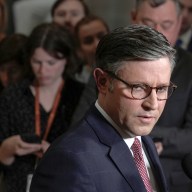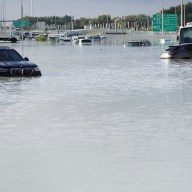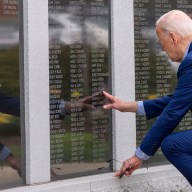Former U.S. president Bill Clinton talks to CNN’s Larry King about BlackBerrys, his politics-devoted family, Palestine and the stimulus bill. The transcript of the video is below, and you can watch it using the player to the right.
LARRY KING: The stimulus bill passed today. The president signed it in Denver. Is it going to work?
BILL CLINTON, FORMER PRESIDENT OF THE UNITED STATES: I think it will do what it’s designed to do. And I think it’s important that the American people understand what it’s designed to do. It’s supposed to do three things. Number one, put money in people’s pockets who are in trouble now — extended unemployment benefits, the modest tax cuts, increase in food stamps.
…The second thing it’s supposed to do is give a chunk of money to state and local governments, primarily for education and health.… The third thing it will do is to create jobs through existing road and bridge contracts, through rail improvements, through modernization and especially through clean energy and energy efficiency.
KING: Do you resent it when the Bush people say that this problem started with you, it started in your administration?
CLINTON: Well, they don’t have much evidence for that. I always answer, does anyone seriously believe if the team I had in place had been in place for the last eight years that this would have happened? And the answer to that is no. We had a much more vigorous regulatory environment with the Securities and Exchange Commission. We were watching these derivatives. I do think we should have done more on derivatives. But the suggestion they have that because we required banks, for the first time, to live up to the requirements of the Community Reinvestment Law, which says you’re supposed to loan money back to the people who deposit money in your bank, contributed to this, I just think is factually wrong.
KING: Should taxpayers be bailing out the automakers? Just today, Chrysler asked for another $5 billion. That’s on top of $4 billion that it got in December. Do we owe this to them?
CLINTON: We don’t owe it to them. We should only do it if it’s in our interests. I believe it’s in our interests…
KING: We keep hearing about Obama’s BlackBerry — he’s got a special BlackBerry now that doesn’t have to be recorded into the White House. Do you have the number?
CLINTON: No. No. But I know that…
KING: Would you like the number?
CLINTON: I know that in the world that exists today, if you’re hyper busy, you need them. Hillary lives on hers. And…
KING: Do you have one?
CLINTON: No, I don’t, because…I — you know, when I want to email somebody, we e-mail somebody. But I don’t — I like being able to concentrate on what I’m doing one thing at a time, you know. And I think if I had one, I’m so hyper and always trying to do three things at once, I’d be worse than he is or worse than she is. So I don’t have one.
KING: So Hillary has got her BlackBerry out there in the Far East. But you won’t communicate to her on your — on any BlackBerry, you’ll call her?
CLINTON: Yes, I call her. I talked to her yesterday morning. And it’s tough now. See, this is the perfect time for BlackBerrys, because she’s in Japan, 14 hours ahead of me, East Coast time. So she was 17 hours ahead of me when I was back on the West Coast a couple of days ago.
KING: All right, how is — it’s kind of strange. I mean you’re a president. Your wife is a senator. Now she’s a secretary of state. What’s (daughter) Chelsea going to be?
CLINTON: Sure it is. But she’s an unusual woman and a gifted one. And I’m very, very proud of her. And our daughter is, too. And I just want her to do whatever she finds rewarding and what makes her happy. But Chelsea has gone back — she’s in graduate school at Columbia now in public health. And she’s always…
KING: Is she interested in government?
CLINTON: Yes, she’s interested in government. She loved the private sector. She wanted to see how it worked. … But I think she really, really cares about health care. She cares about public health. She thinks that America has still got a ways to go to develop an affordable, high-quality health care system. And I think she wants to be a part of it.
KING: There are some who say, Mr. President, that Afghanistan could be Barack Obama’s Vietnam. Do you buy that?
CLINTON: Well, in theory, it could happen. But I don’t think so. And I think what they mean is that Afghanistan has often been a sinkhole for other countries’ aspirations, that it is big, tough terrain, rugged people and impossible to control the borders.
KING: People know about charities and that you handle people who made donations. But where does the global initiative fit in all of this?
CLINTON: Well, my foundation work is basically divided into three baskets, if you will. There is (the Clinton presidential) library, which I’m very proud of, which is an educational institution, and the first federally managed building to win the top environmental award from the U.S. Green Building Council. And there is my School of Public Service, which is the only school in America that offers a masters degree in public service.
…Then the second thing I have is my foundation, and that’s headquartered in Harlem. They run our massive AIDS program, which provides medicine to about 1.5 million people; our malaria program; the small business mentoring program in New York and elsewhere; our national effort against childhood obesity; and our effort to help cities all over the world combat climate change. We’re supporting millions of square feet of retrofit and closing down landfills, and doing all that.
Then the third thing is what most people know about, the Global Initiative, which meets twice a year, once at the opening of the UN We bring in business people and political leaders and philanthropic leaders.
KING: Do you see any, any chance of the Mideast having peace?
CLINTON: I do.
KING: George Mitchell have a lot to do with it?
CLINTON: Well, he can. He’s going to have to fill in the blanks, you know, with people. But look, however the Israeli government is constituted—
KING: We don’t know yet.
CLINTON: No. And however divided the Palestinians are, there are two things that give us hope. One, the underlying realities haven’t changed. Palestinians are having more babies than the Israelis. The Israelis have to decide whether they want to share the future in a positive way with a constructive Palestinian state, so that they have a Jewish democracy, which is what Israel was set up to be. And if they don’t, then they’ll have to disenfranchise the Palestinians living outside of old Israel, pre-’67 Israel, and they won’t be a democracy anymore. Or they will let everybody vote and they won’t be a Jewish state anymore. That hasn’t changed. The other thing that has happened that’s really better now is the external environment is so much better.
The king of Saudi Arabia and I think more than 20 other Muslim countries in the whole Arab Middle East, with the exception of Syria, has been out there strongly supporting a peace process and basically saying, if you will give the Palestinians a state in the West Bank and Gaza, with appropriate compromises — essentially, what I proposed in 2000 that Israel accepted then — we will strongly support it. We will urge the Palestinians to sign it. We will help them succeed economically. We will relocate them. Now, therefore, I think there’s hope, and I don’t see what the alternative is.















